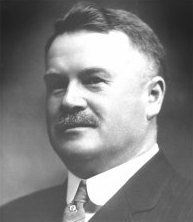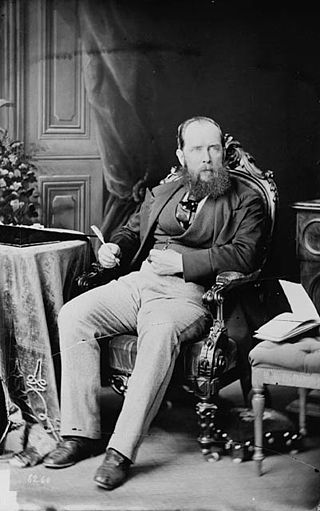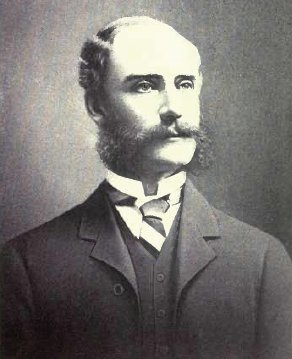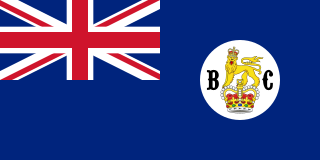Related Research Articles

Sir George-Étienne Cartier, 1st Baronet, was a Canadian statesman and Father of Confederation. The English spelling of the name—George, instead of Georges, the usual French spelling—is explained by his having been named in honour of King George III.

Amor De Cosmos was a Canadian journalist, publisher and politician. He served as the second premier of British Columbia.

Simon Fraser Tolmie, was a veterinarian, farmer, politician, and the 21st premier of British Columbia, Canada.

John Robson was a Canadian journalist and politician, who served as the ninth premier of British Columbia.

Sir Joseph William Trutch, was an English-born Canadian civil engineer, land surveyor, and politician who served as first Lieutenant Governor of British Columbia.

Joseph Despard Pemberton was a surveyor for the Hudson's Bay Company, Surveyor General for the Colony of Vancouver Island, a pre-Confederation politician, a businessman and a farmer. He was born in 1821 in Dublin, Ireland and died in 1893 in Oak Bay, British Columbia. Joseph Pemberton laid out Victoria's town site, southern Vancouver Island and townsites along the Fraser River. He married Teresa Jane Grautoff and they are the parents of Canadian painter Sophie Pemberton. The town of Pemberton was named after him.

The Colony of British Columbia was a British Crown Colony that resulted from the 1866 merger of two British colonies, the Colony of Vancouver Island and the mainland Colony of British Columbia. The united colony existed until its incorporation into Canadian Confederation in 1871 as the Province of British Columbia.

The Colony of British Columbia was a crown colony in British North America from 1858 until 1866 that was founded by Richard Clement Moody, who was selected to 'found a second England on the shores of the Pacific', who was Chief Commissioner of Lands and Works for British Columbia and the first Lieutenant-Governor of British Columbia. Prior to the arrival of Moody's Royal Engineers, Columbia Detachment, the Colony's supreme authority was its Governor James Douglas, who was the Governor of the neighbouring colony of Vancouver Island.
An executive council is a constitutional organ found in a number of Commonwealth countries, where it exercises executive power and (notionally) advises the governor, governor-general, or lieutenant governor, and will typically enact decisions through an Order in Council. In several Commonwealth countries, the executive council is usually referred to as the cabinet. However, the use of the word cabinet as a synonym for the executive council is not universally practised throughout the Commonwealth of Nations, with some Commonwealth countries using the term cabinet to refer to a distinct group of high-ranking officials.

John Sebastian Helmcken was a British Columbia physician who played a prominent role in bringing the province into Canadian Confederation. He was also the founding president of the British Columbia Medical Association.

The Legislative Council of British Columbia was an advisory body created in 1867 to the governor of the "new" United Colony of British Columbia, which had been created from the merger of the old colonies of Vancouver Island and British Columbia. The new colony, like its predecessors, did not have a responsible government, and while its debates and resolutions carried considerable weight, executive power remained in the hands of the governor, who at the time of the council's founding was Frederick Seymour.

The Legislative Assembly of Vancouver Island, sometimes House of Assembly of Vancouver Island, was the colonial parliamentary body that was elected to represent voters in the Colony of Vancouver Island. It was created in 1856 after a series of petitions were sent to the Colonial Office in London protesting the Hudson's Bay Company's proprietary rule over the colony. It was the first elected assembly in British North America west of Ontario. Although at first only handful of colonists met the voting requirement, and most of those that did were tied to the HBC, the franchise was gradually extended, and the assembly began to assert demands for more control over colonial affairs, as well as criticize colonial governor Sir James Douglas's inherent conflict of interest as both governor and Hudson Bay Company's chief factor.

Charles Hotson Ebden was an Australian pastoralist and politician, a member of the New South Wales Legislative Council, the Victorian Legislative Council and the Victorian Legislative Assembly.
The Legislative Council of British Columbia held its second election in 1869. BC was a colony formed by the union of the colony of Vancouver Island and the colony of British Columbia..
Sir Alfred Joseph Karney Young was a British barrister and judge. He held a number of political and judicial offices, including Attorney General of British East Africa, Chief Justice of the Seychelles, Attorney General of Fiji, Chief Justice of the Leeward Islands, Chief Justice of Fiji, and Chief Judicial Commissioner for the Western Pacific.
The New Year Honours 1912 were appointments by King George V to various orders and honours to reward and highlight good works by members of the British Empire. They were announced on 29 December 1911.
The 1892 New Year Honours were appointments by Queen Victoria to various orders and honours of the United Kingdom and British India.
The 1889 Birthday Honours were appointments by Queen Victoria to various orders and honours to reward and highlight good works by citizens of the British Empire. The appointments were made to celebrate the official birthday of The Queen, and were published in the London Gazette on 24 May 1889 and in The Times on 25 May 1889.
The 1892 Birthday Honours were appointments by Queen Victoria to various orders and honours to reward and highlight good works by citizens of the British Empire. The appointments were made to celebrate the official birthday of The Queen, and were published in the London Gazette on 24 May 1892 and in The Times on 25 May 1892.
The 1895 Birthday Honours were appointments by Queen Victoria to various orders and honours to reward and highlight good works by citizens of the British Empire. The appointments were made to celebrate the official birthday of The Queen, and were published in The Times on 25 May 1895 and in The London Gazette on 25 May 1895 and on 11 June 1895.
References
- ↑ "JOURNALS OF THE LEGISLATIVE COUNCIL OF BRITISH COLUMBIA - 24 JANUARY 1867 TO 2 APRIL 1867". Archived from the original on 11 May 2013. Retrieved 2012-05-10.